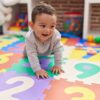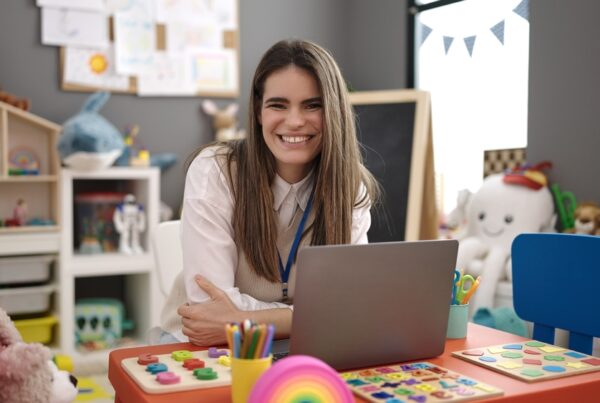Babies take their first steps at about 12 months old. About three months to either side of that date is normal for this milestone. That is a fairly large range to call “normal” amounting to about one-third of the child’s life. Learning to talk has a similarly wide range. It is considered normal for a child to say their first word between nine and 14 months. And their first two-word sentences can occur anytime between 18 and 24 months.

Moving ahead
Let’s skip forward, far forward, to a different milestone. If I said that everyone is ready to get married at 25, you would surely disagree. Just like getting ready to walk or talk takes the combined skills of the brain and body working together, being ready to get married has implications of both social and emotional development. A more accurate statement might be that most humans are ready to get married between ages 20 and 30. Once again, the window is about one-third of our total life span to that point.
But what about school?
Now let’s back up and talk about school. Why do we say that every single child is ready for formal schooling at age six? How can we make the window so narrow? Why do we believe that every child is ready for school at the same age? We don’t hit any other milestone at the same age and if we applied the same “one-third of our life span” mentality we have about walking and marriage, that would mean that most children are ready for formal schooling at some point between ages four and eight.
Doesn’t it make sense that, like other huge life milestone moments, being ready for schooling should be a large window, instead of a specific moment? Why do we think of this milestone so differently? And once we start our children down the path, saying that there is a specific age when they will be ready to learn to read, write and add, we expect them to comply to our timeline.
To make matters worse, in our eagerness to make the long path of education more efficient, kindergartens, and then preschools, started teaching reading, writing, and math. It doesn’t matter that many children truly weren’t ready for that material, and wouldn’t be for a few years, they had to be taught anyway.

Apply that logic to walking
If we taught walking this way, we would put all 12-month-old children in walking class. Some children would come to classes already walking and be told to help those who couldn’t walk yet. Those who learned to walk at the designated time, in the “right” way, would be rewarded. Those who learned to walk later would be singled out. Their parents would be told that they were “behind” and given remediation plans. Most of the children would learn to walk. People would give the class credit, because “That’s where my baby learned to walk.” Even though they could have learned the skill just fine at home, with less stress.
Okay, this is obviously tongue in cheek. However, what our schools are doing, is going a step farther. They have started pushing children younger and younger to do the desired skills.
This would be like making walking classes start at nine months old when almost none of the children are, developmentally ready to walk. Yes, you might coach a few to walk earlier. But those babies still won’t have the cognitive development to not walk off a cliff or out into traffic. The point is that while they may have the skill, they really aren’t ready to use it.
There is more to being ready for school than turning six.
Being ready for school work requires an even stronger brain-body connection than walking. To be able to read and write, the hands and eyes need to have developed high-level skills and be able to translate those skills through the brain in such a way that they can get abstract results. Letters are an abstract representation of a sound that combines to make words. This requires very complex thought processes in the brain.
To be prepared to take instructions from an adult and get along with peers, children need to have social and emotional skills to self-regulate, cooperate, and grasp the nuances of human interaction. These are skills that take time to develop and require a lot of trial and error, usually through play and family interactions. And rushing things doesn’t make the whole process faster.
Reading and writing earlier, does not give the child a reason to use those skills any sooner. Most children won’t start reading chapter books to themselves until they are at least eight, no matter when they learn to read. Late and early readers, both, need time for their cognitive skills to develop so that they have the attention and ability to picture the story in their head while reading. Those are cognitive skills that develop for each child in their own time, just like knowing not to run out into a busy street.
They are also not ready to read recipes and cook for themselves as pre-schoolers. They are not ready to study a new topic on their own as they will as adults. Children need adults to read to them and use the skills of reading—like following a recipe—with them until they are at least eight. So why do we think they need to start reading at four or five?
Your four or five-year-old is not ready to write a novel. The drive to push math into younger and younger brains has also not been found to benefit either the field of mathematics or the child. A child’s readiness for abstract math, like what is found in most high school courses, cannot be rushed. Once again, the child’s brain needs to mature to be ready to write stories or do higher-level math. Starting younger doesn’t prepare a child for adult life, it just steals their childhood.

Focusing on the skills of childhood
But, some argue, there are children who do just fine learning at a younger age. There are those that got married at 21, does that mean everyone should? There are those who may be socially and emotionally ready for marriage at 21, but I’m sure you know at least one person who was not socially and emotionally ready for marriage at 21. Perhaps because there are so many other things they should be doing first.
And that is an important point. The problem isn’t just that children don’t need to read, write and do the math so young. The problem is that they also need to do other things first, before learning those skills. The push for those skills has made our preschools and kindergartens skip past those skills they need to learn first.
Children need to learn about sharing and taking turns. They need to learn about size and shape and order and chaos before they learn about numbers. They need to learn to draw pictures and paint with their fingers before they start writing. And children need to learn to tell a story before they learn to write it down. We are skipping past these essential things in a rush to push our children towards adult skills and forcing them to miss out on the skills of childhood.
Stepping back
The other sad part of stating that every child will be ready to read or write at the same age in elementary school is that we say they will hit all their academic milestones at the same time as their peers for the next 12 years. At the same age each student has to learn to write essays, to do Algebra, to speak another language, to drive a car. All of this leads to graduating high school and starting college or going to work at the same time. There is almost no way to slow down or re-group from the predesignated path.
Every child needs to be given room to grow and develop at their own pace. I believe in encouraging the skills of childhood with story times, games, songs, and toys. Every child should get a chance to learn things when their brains and bodies are ready. Without the pressure to do it on a timeline that isn’t developmentally appropriate for any child.
Forging a new path
Instead of grades, we need to let our children move through stages until they are ready for adulthood. Some children would spend longer in some stages than others, and that would be fine. Every child should be able to grow at their own pace, not a prescribed one that is a driving forced march towards adulthood.
Laura Sowdon, OTR/L is an occupational therapist, writer, speaker and educator.









